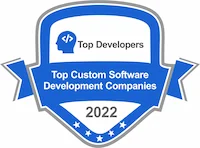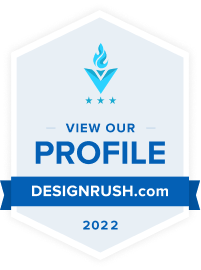
Dedicated agile development teams
A managed team of specialists: agile, autonomous and adaptable to the needs of each project.
What is a dedicated agile team?
Squads are multidisciplinary teams that work under the scrum or kanban methodology, and are assigned to one or more projects in order to fill skill/capacity gaps in organizations and satisfy software development needs.
They are autonomous, self-sufficient and adaptive teams, they can increase or reduce their size depending on the needs and be seen as a unit, abstracting stakeholders from daily management.
Service Features
- Communication: We establish a "Squad Manifesto" that defines the working methodology for clear and mutual understanding, and the communication channels for effective interaction.
- Riduzione del rischio: La tua partecipazione come stakeholder nella pianificazione e accettazione di ogni sprint minimizza i rischi consentendo rapidi aggiustamenti e limitando le deviazioni a una singola iterazione o compito.
- Visibilità del progetto: Utilizziamo MyTaskPanel SaaS per gestire il progetto online, fornendo trasparenza e accesso a tutto il team e agli stakeholder.
- Controllo del budget: Riceverai rapporti periodici con il totale delle ore pianificate e consumate dal team in ogni iterazione, garantendo un controllo preciso del budget assegnato.
- Qualità: I criteri di accettazione vengono convertiti in casi di test, che gli stakeholder aiutano a definire, garantendo la massima qualità nello sviluppo.
- Flexibilità: Adattiamo la dedizione mensile del team al carico di lavoro concordato con te, bilanciando i costi e la velocità di sviluppo.
Agile Development Cycle (Scrum)
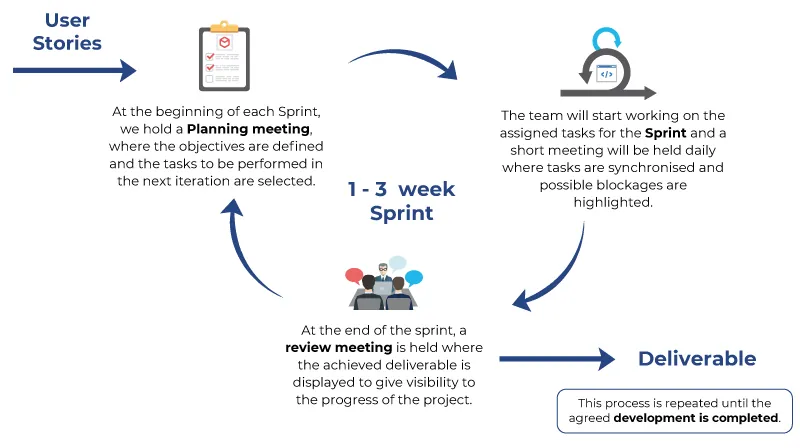
Agile Development Cycle (Kanban)
In a Kanban board, where each column represents a stage in the development cycle, each individual task progresses through the circuit until it is finished, in a continuous cycle of work.
This methodology is used for corrective and/or evolutionary maintenance projects.
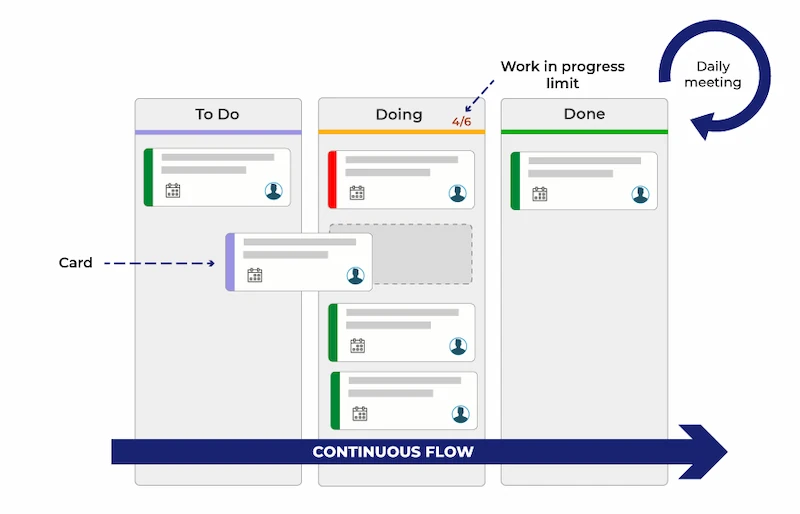
The step by step to get your dedicated team
Requirements and proposal assembly
We sign a confidentiality agreement and, once we know your requirements, we put together a proposal with an agile team (Agile Squad) adapted to your needs and determine the most appropriate development cycle.
Project organisation
When the budget is approved, we plan the project with the "agile" philosophy. For scrum, we create a "technical backlog" that will be the basis of the whole project plan. For kanban, we create the first cards to be made.
Overall planning
We provide you with a "Squad Manifesto" with the project planning, the work methodology, the roles of each team member, the meetings to be held, the communication channels to be used, the reporting scheme, the testing mechanisms, etc.
Project follow-up
In addition to the daily meetings, we hold weekly meetings with you to discuss progress. In the case of scrum, at the end of each sprint, we present the development done along with a report on it.
Team configuration
Depending on the customer’s needs, we have different teams models:
- Standard: We have teams experts in various technological stacks, with a standard configuration (product owner, scrum master, architects, designers, developers, devops, testers) to develop a projects from scratch.
- Product: Composed of a product owner and designers, applicable to projects whose objective is to interpret and define the design of a new product.
- Architecture or CTO as a service: Teams made up of a CTO and solution architects, ideal for establishing the architecture of a product or defining its technology stack.
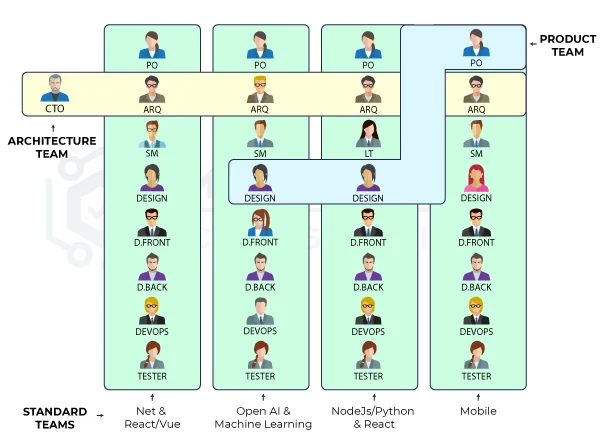
Monthly Closure
Hours Report >
For Scrum projects, the report on the effort actually employed in the sprint will be presented during the review meeting.
For Kanban projects, a report on the completed tasks will be presented monthly.
Approval >
Verify that the presented report matches your internal records and the commitment made.
Billing >
For Scrum projects, an invoice will be issued after each sprint closure.
For Kanban projects, an invoice will be issued at the end of the month.
Service Guarantees
- Prior to the start of the project, we deliver a “Squad Manifesto” adapted to your project, in which all the agreed work methodology is reflected, which includes a description of the ceremonies or meetings to be held, the communication channels to be used, the characteristics of the sprints, the testing and reporting mechanism, the way to define a feature to be developed, etc.
- As a stakeholder, you are one more member of the team and you participate in the planning, refinement and acceptance of each sprint, so the transparency of the process is absolute and the risk of deviation is limited to one sprint (2 weeks) in the case of scrum or to a task in the case of kanban.
- The project management is carried out in an online proprietary software (MyTaskPanel SaaS) to which the entire team will have access and ensures transparency of the ongoing work.
- The Team Leader will provide, at the pre-agreed frequency, a report that accounts for the total hours consumed by the team, ensuring you have full visibility and control over the budget.
- The acceptance criteria of each product backlog will be considered as test cases in each user story, which the stakeholders will help design, so that the quality of the development will be assured.
- The monthly amount of hours to be dedicated by the squad is adapted to the workload pre-agreed with the stakeholder.
When to choose this modality
This type of contracting is appropriate in most cases, but especially in the following situations:
- You do not have your own team.
- The challenge is complex and requires different skills.
- You are not sure how long it will take to complete the project and you want to delegate decisions to highly skilled staff.
- You are dealing with long-term projects with broad scopes and potential changes in requirements.
- The internal team lacks experience and/or expertise related to the project in question.
- This is a one-off technology project that does not justify hiring an in-house team.
- The in-house team is focused on other development projects and cannot take on more work.
- You need to delegate the corrective and evolutive maintenance of a product to an external team.








